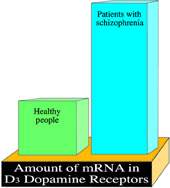Are you a journalist? Please sign up here for our press releases
Subscribe to our monthly newsletter:

The biological basis of schizophrenia - a mental illness characterized by disturbances in emotional functioning, perception of reality, and thought processes - is still a mystery. Psychiatric and behavioral assessments have until now been the sole tools used for its diagnosis. However, a recent study by Prof. Sara Fuchs and graduate student Tal Ilani of the Weizmann Institute's Immunology Department suggests that schizophrenia could one day be diagnosed using a relatively simple blood test.
Research findings worldwide have suggested a possible connection between the illness and excessive activity of a neurotransmitter involved in communication between nerve cells in the brain. The activity of this chemical messenger, called dopamine, is dependent, among other factors, on the number of dopamine receptors on the surface of nerve cells. In fact, postmortem studies of the brains of schizophrenic patients, as well as PET scans of the brains of living patients, have indicated the existence of a disproportionately high number of these receptors. Unfortunately, however, it is impossible to assess with sufficient precision the number and location of dopamine receptors in the brains of living schizophrenics.
Fuchs and Ilani have proposed a way of skirting this problem. They suggest evaluating the presence of dopamine receptors on the surface of lymphocyte white blood cells as a potential diagnostic test for schizophrenia. To examine this possibility, the scientists compared blood samples taken from schizophrenic patients with blood samples from healthy individuals.
Since identifying dopamine receptors on the surface of white blood cells is extremely difficult, the scientists focused on an earlier stage in receptor formation. They zeroed in on the stage at which messenger RNA (mRNA) molecules cart the genetic information needed for making dopamine receptors from the cell nucleus to the ribosome - the small cellular "factory" where the receptors are manufactured.

A statistical analysis showed that the blood of schizophrenics contains, on average, 3.6 times more messenger RNA molecules encoding the production of specific dopamine receptors, called D3 (D3RmRNA) than that of healthy people. The high levels were observed in patients treated with a variety of drugs as well as in the control (medication-free) group. On the basis of these findings, published in the Proceedings of the National Academy of Sciences, U.S.A., the researchers suggest that blood tests determining the level of D3RmRNA in white blood cells may be used to diagnose schizophrenia.
The research team included Dr. Dorit Ben-Shachar of the Rambam Medical Center and the B. Rappaport Faculty of Medicine at the Technion-Israel Institute of Technology; Drs. Rael D. Strous and Moshe Kotler of the Beer Yaakov Mental Health Center; and Drs. Marina Mazor and Ala Sheinkman of the Mental Health Center in Tirat Hacarmel, Haifa.